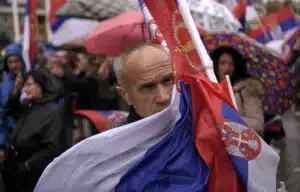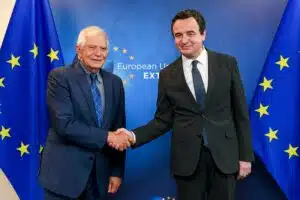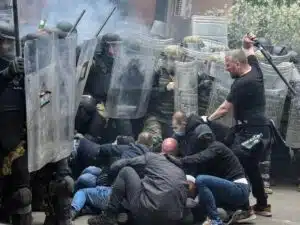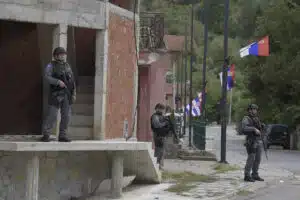Brussels – Northern Kosovo is back in the spotlight of the European Union after Pristina decided to have Kosovo police close nine Post of Serbia branches in the north of the country yesterday (Aug. 5), triggering a reaction from Brussels. The EU considers the move “a unilateral and uncoordinated step, which violates agreements reached in the EU-facilitated dialogue,” according to a European External Action Service (EEAS) statement.

Kosovo police shut down three branches in Kosovska Mitrovica, one in Zubin Potok, two in Zvečan, and three in Leposavić as authorities claimed they were operating without a license and not registering with the relevant Kosovo agencies. The decision came just months after the closure of several postal savings banks in the region that ethnic Serbian minorities used to receive salaries from Belgrade and to make payments in dinars, banned since Feb. 1 on the domestic market. These are the first consequences of the Regulation on Transparency and Stability of Financial Flows and Combating Money Laundering and Counterfeiting, impacting all those public services in northern Kosovo that never adjusted to Pristina’s adoption of the euro in 2002 (even before independence in 2008). Belgrade has never recognized Kosovo’s sovereignty, which is why it still pays salaries, pensions, and family allowances in dinars to a substantial share of Kosovar citizens in the Serb-majority areas of the country.

The European Union is struggling to keep political tensions between Pristina and Belgrade under control. However, it is not giving up on its mediation efforts. “As part of the Arrangements regarding Telecommunications reached in 2013 and the Action Plan agreed in 2015, both Parties agreed to discuss postal services ‘at a later stage’, thereby acknowledging that the issue can only be addressed within the framework of the Dialogue,” the EEAS noted. That is why, after the last failed trilateral summit in late June in Brussels between the EU High Representative for Foreign Affairs and Security Policy, Josep Borrell, Kosovo premier, Albin Kurti, and Serbian president, Aleksandar Vučić, EU negotiators were “ready to put the issue on the agenda of the next dialogue meeting.” However, the call remains for the Kosovo government to “reconsider its decision and find a negotiated solution.”
Clearly, the main problem at the heart of regional issues in the north of the country is the Association of Serb-majority Municipalities in Kosovo, i.e., the community in the country that wants autonomy over a whole range of administrative matters, including the operation of the National Bank of Serbia, the Savings Bank and the Post Office of Serbia. “Unilateral and uncoordinated actions cannot offer solutions to this or any other issue that belongs to the normalization process between Kosovo and Serbia,” the EEAS warned, making clear that “closing existing services of Kosovo Serbs, without any new prior agreed arrangement, will further negatively affect the daily lives and living conditions of this community.”
Tensions in northern Kosovo
More than a year has passed since the first event that kicked off one of the most complex and violent periods of Serbian and Kosovar relations. Violent protests broke out after the newly elected mayors took office in Zubin Potok, Zvečan, Leposavić, and Kosovska Mitrovica on May 26, 2023. Within three days, the clashes turned into guerrilla warfare that also involved soldiers from the NATO-led international KFOR mission. Tensions erupted after the Pristina government sent police special forces to allow the mayors elected on April 23 into the municipalities in a controversial election round due to the incredibly low voter turnout.

Meanwhile, on June 14, Serbian security services arrested/kidnapped three Kosovar police officers. The governments of Pristina and Belgrade accused each other’s law enforcement agencies of trespassing. Brussels convened an emergency meeting with Kosovar Premier Albin Kurti and Serbian President Aleksandar Vučic to exit “crisis management mode.” The release of the three Kosovar police officers came on June 22. However, due to Pristina’s failure to take a “constructive attitude” to de-escalate tension, Brussels in late June imposed “temporary and reversible” measures against Kosovo (still in place, despite the roadmap agreed on July 12). Tension escalated with the terrorist attack on September 24, near the Serbian Orthodox monastery in Banjska, when clashes between the Kosovo Police and a group of about 30 gunmen killed a policeman and three attackers.
Developments in the attack showed clear ties to neighboring Serbia. Among the bombers outside the monastery was Milan Radoičić, deputy head of Lista Srpska – as he confirmed a few days after the armed attack – and Milorad Jevtić, a close associate of the Serbian president’s son, Danilo Vučić. To make matters worse, the United States warned of a “major Serbian military deployment” along the administrative border. Nothing came out of it, but the EU began to reflect on the possibility of imposing on Belgrage the same measures that are in place against Pristina. However, to do this requires unanimity in the Council, and Vučić’s closest ally inside the Union – the Hungarian premier, Viktor Orbán – vetoed. As if that were not enough, before early elections in Serbia on December 17, the last act of the government led by Ana Brnabić was to send a letter to Brussels to warn that Serbian institutions do not recognize the legal value of the verbal commitments made in the context of the Pristina-Belgrade dialogue and that it will also not recognize the de facto sovereignty of Kosovo.
The only positive news for now is the resolution of the ‘battle of the license plates’ between Serbia and Kosovo, thanks to the decision between late 2023 and early 2024 on mutual recognition for vehicles entering the border, even given this year’s unpromising assumptions. As the Regulation on Transparency and Stability of Financial Flows and Combating Money Laundering and Counterfeiting came into force on Feb. 1, the euro became the sole currency of exchange and deposit in bank accounts. It is still possible to exchange the Serbian dinar like the Albanian lek or the dollar. However, the decision will impact all those public services that never adjusted to Pristina’s adoption of the euro in 2002 (even before independence). On Feb. 5, special police operations at the offices of the temporary institutions run by Serbia in four municipalities in northern Kosovo (Dragash, Pejë, Istog, and Klinë) and at the headquarters of the Center For Peace and Tolerance NGO in Pristina raised controversy in Brussels. Since 2008, Belgrade has continued to fund municipalities, companies, public enterprises, kindergartens, schools, public universities, and hospitals available to the Serb minority illegally, according to the Kosovo Constitution.
Find more insights on the Balkan region in the BarBalkans newsletter hosted by Eunews
English version by the Translation Service of Withub








